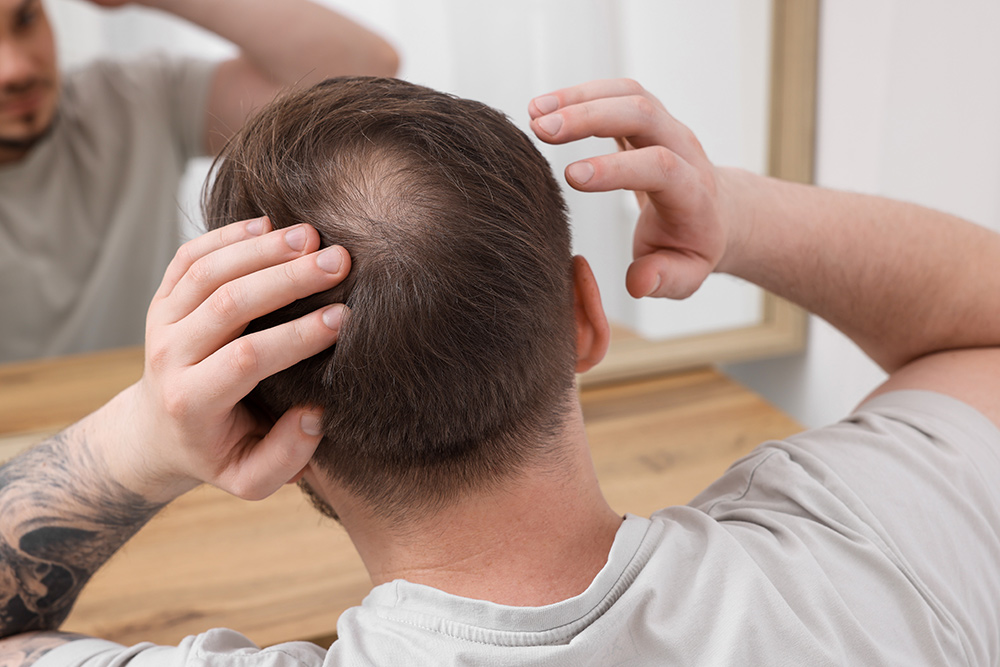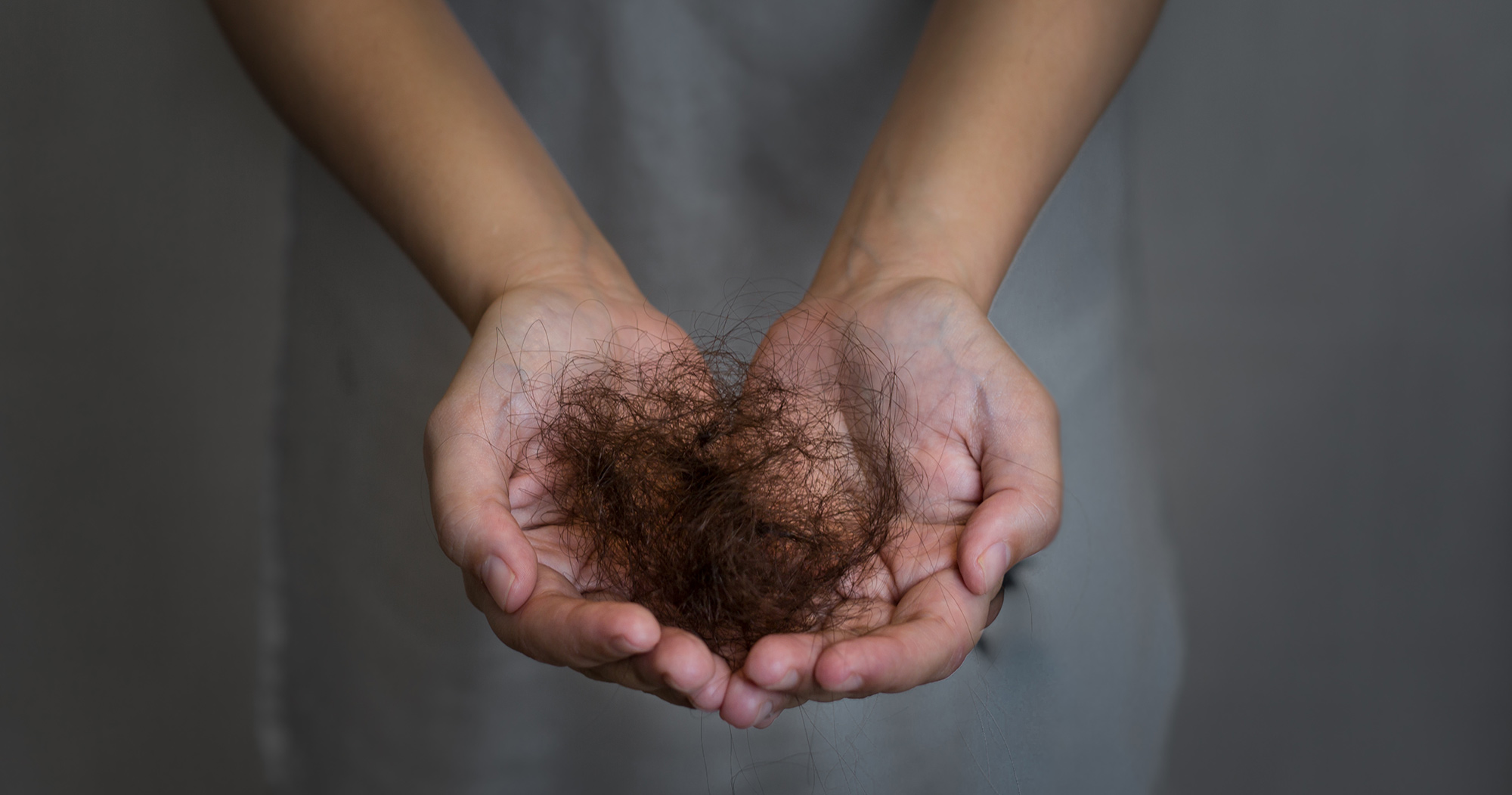Does Diabetes Cause Hair Loss? The Surprising Truth Revealed!
Last updated on October 9, 2025
Diabetes is a condition that affects millions of people worldwide. While most people connect it with blood sugar levels, fatigue and circulation problems, fewer realize it can also affect hair growth. If you are asking Does diabetes cause hair loss?, the answer is yes, it can. The connection is complex, but it is becoming increasingly clear that diabetes influences hair health in several ways.
Understanding the relationship between diabetes and hair loss can help you recognize symptoms earlier and take steps to protect your scalp and restore growth.
Is Hair Loss a Sign of Diabetes?
Hair loss alone is not usually enough to diagnose diabetes, but it can be a sign when combined with other symptoms. Diabetes affects circulation and hormone balance, both of which play roles in maintaining healthy hair. If you notice increased shedding along with unexplained weight changes, excessive thirst, frequent urination, or slow wound healing, it is important to speak with a doctor.
Hair loss is not always the first or most obvious symptom of diabetes, but it can be a clue that the body is struggling to maintain balance.
Why Does Diabetes Cause Hair Loss?
Several factors link diabetes and hair loss. The condition impacts multiple systems in the body, and each can interfere with the hair growth cycle.
- Poor circulation: Diabetes can damage blood vessels, reducing blood flow to the scalp. This limits the delivery of oxygen and nutrients that follicles need to grow healthy hair.
- Hormonal imbalances: Insulin resistance and other hormonal disruptions affect the normal rhythm of hair growth and shedding.
- Immune system involvement: Diabetes increases the risk of autoimmune conditions like alopecia areata, which directly attacks hair follicles.
- Stress and illness: Living with diabetes can be physically and emotionally stressful, both of which are known triggers for hair shedding.
- Medications: Some treatments for diabetes may list hair thinning as a potential side effect.
Together, these factors can lead to thinning hair on the scalp, eyebrows, or even body hair.
What Does Diabetes-Related Hair Loss Look Like?
Diabetes-related hair loss often presents as diffuse thinning, meaning hair becomes sparser across the scalp rather than forming bald patches. You may also notice slowed regrowth after normal shedding. For some, hair becomes finer and more brittle.
In autoimmune cases, such as alopecia areata linked with diabetes, hair may fall out in small, round patches. Others may experience body hair loss, including thinning of arms or legs. Because the appearance can vary, professional evaluation is the best way to determine whether diabetes is playing a role.
Will Hair Loss From Diabetes Grow Back?
A common concern is whether hair loss from diabetes grows back. In many cases, hair regrowth is possible once blood sugar levels are controlled and circulation improves. However, recovery takes time and is not always complete.
If hair follicles have been permanently damaged due to long-term poor circulation or autoimmune attack, regrowth may be limited. Early intervention improves the chances of restoring thickness. Combining medical treatment for diabetes with specialized hair restoration care offers the best outcomes.
How to Stop Hair Loss From Diabetes
If you are wondering how to stop hair loss from diabetes, several strategies can help:
- Control blood sugar levels: Keeping glucose within target ranges reduces complications that affect scalp circulation.
- Eat a balanced diet: Adequate protein, iron, zinc, and vitamins support hair growth.
- Exercise regularly: Physical activity improves circulation, which benefits hair follicles.
- Manage stress: Stress worsens both diabetes and hair shedding. Relaxation techniques can help.
- Gentle hair care: Avoid harsh styling, heat, or chemicals that add strain to already weakened follicles.
- Seek specialist care: Hair restoration clinics offer treatments such as Growth Factor Therapy, exosome therapy and hair transplantation when shedding persists.
At AZ Hair Restoration, we provide comprehensive evaluations to identify whether your diabetes is linked to your hair loss and develop custom plans that support regrowth.
Diabetes and Hair Loss in Women vs. Men
Both men and women with diabetes can experience hair thinning, though it may look different. In men, thinning often overlaps with male pattern baldness, making it difficult to separate the two causes. In women, diabetes-related hair loss may present as general thinning across the scalp or noticeable widening of the part line.
Regardless of gender, the underlying mechanism is the same: poor circulation, hormone imbalances and stress on the body disrupt the natural hair cycle.
When to See a Doctor About Your Hair Loss
If you notice persistent thinning or excessive shedding, it is best not to ignore it. Diabetes and hair loss together may indicate that blood sugar is not well controlled or that another condition, such as alopecia areata, is present.
A specialist can determine whether your hair loss is due to diabetes, genetics, or another factor. At AZ Hair Restoration, Dr. Arthur Zacco combines decades of expertise with advanced treatments to restore hair density and scalp health.
Hair Restoration Options for Diabetes-Related Hair Loss
While managing diabetes is the first step, hair restoration treatments can provide additional support. At AZ Hair Restoration, we offer:
- Growth Factor Treatment to stimulate follicles using your body’s natural healing response.
- Exosome Therapy to deliver regenerative signals directly to the scalp and encourage repair.
- FUE and FUT Hair Transplants for permanent hair restoration when regrowth is limited.
- Custom treatment plans tailored to each patient’s health history and goals.

By combining medical management of diabetes with targeted hair restoration, patients see improved results in hair regrowth, density and health.
Take Control of Diabetes-Related Hair Loss
Diabetes can affect your health in many ways, including the health of your hair. The good news is that with the right care, hair loss does not have to be permanent. At AZ Hair Restoration in Raleigh, NC, Dr. Arthur Zacco provides advanced non-surgical treatments, from Growth Factor Therapy and exosome therapy, as well as surgical hair restoration through FUE and FUT transplants, designed to restore density and growth.
If you are noticing thinning hair, do not wait until it progresses further. Book a free consultation today and take control of your hair health.
FAQs
Can both type 1 and type 2 diabetes cause hair loss?
Yes, both type 1 and type 2 diabetes can cause hair loss because both forms of the disease can affect circulation, hormone balance and immune system function. The degree of hair loss varies, but management of blood sugar is essential in both cases. At AZ Hair Restoration, Dr. Arthur Zacco helps men and women with diabetes-related thinning regain hair density through tailored treatments. Book your free consultation today at our Raleigh, NC, clinic and explore effective hair growth solutions.
Is hair loss from diabetes permanent?
Hair loss from diabetes is not always permanent. When caught early and managed with proper blood sugar control, hair may regrow. However, long-term damage to follicles or severe autoimmune responses can cause permanent thinning. In such cases, professional treatments are highly effective. Dr. Arthur Zacco offers FUE, FUT and non-surgical therapies to restore hairlines. Book your free consultation in Raleigh, NC, today to see what restoration options may work for you.
Can diabetes medications cause hair loss?
Some diabetes medications may list hair thinning as a potential side effect, though this is less common than hair loss from the disease itself. If you suspect your medication is contributing, speak with your doctor before making changes. At the same time, consulting a hair specialist is valuable. Our hair loss clinic in Raleigh, NC, provides expert evaluation and advanced solutions to restore healthy growth. Contact us today to book your free consultation and learn about your options.
What role does stress play in diabetes and hair loss?
Stress worsens both diabetes and hair loss. Physical and emotional stress can disrupt the hair cycle, causing more shedding than usual. Since living with diabetes can be stressful, managing it with relaxation techniques, exercise, or counseling can reduce hair loss. At our hair restoration clinic in Raleigh, we treat both the symptoms and underlying causes of thinning with custom therapies. Book a free hair loss consultation with Dr. Arthur Zacco today to get support for your hair restoration journey.
What treatments are available in Raleigh, NC, for diabetes-related hair loss?
Once blood sugar is controlled, medical hair growth treatments such as Growth Factor Therapy, exosome therapy and hair transplants can help restore density and stimulate growth. At AZ Hair Restoration, we tailor treatments to each patient’s needs and health history. With decades of experience, Dr. Arthur Zacco ensures safe and effective care. Contact us today to schedule your free consultation in Raleigh, NC and take the first step toward reversing the effects of diabetes on your hair.








